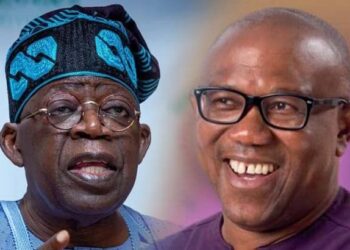John Omachonu
Determined to have a firm grip on the economy foe economic development, Central Bank, (CBN) recently to ditched the unorthodox monetary policy by hiking the monetary Policy Rate, (MPR) by 150 basis points, after 70 months of maintaining the status quo.
MPR is an anchor rate that CBN sets in order to influence its monetary policy.
Although monetary policy can impact on entire interest rates, but forces of supply and demand in specific markets have some roles to play on lending and borrowing.
But, the big question today is, to what extent is the anchor rate serving as the true anchor for rates in the volatile operating environment being experienced today?
For instance, until recently, the said anchor rate, which the deposit money banks are supposed to base their borrowings and lending, had been at 11.5 percent.
The implication is that banks are supposed to borrow money from CBN or lend money to customers on certain percentages above or below the MPR, factoring other overhead costs.
More worrisome is the fact that even at the new rate of 13 percent, it is still below the inflationary rate, making rates being displayed by banks at their banking halls as very unrealistic.
Banks’ borrowing from CBN has witnessed rising trend, possibly due to liquidity squeeze being experienced, particularly in May, rising by 63 percent, Month-on-Month, to N1,8 trillion.
Specifically, CBN has two short term lending windows for banks, the Standing Lending Facility, (SLF) and Repo lending.
CBN lends money to banks through the SLF at interest rate of 100 basis points, (bpts), above the MPR as well as the through the Repurchase agreement.
On the Other hand, CBN accepts deposits from banks through its Standing Deposit Facility, (SDF) and pays an interest rate of 700 bpts below the MPR.
Part of the May MPC meeting communiqué, according to Godwin Emefiele, CBN Governor was, “In summary, the MPC voted to (1) Raise the MPR to 13.0 percent , (2) Retain the asymmetric corridor of +100/-700 basis points around MPR.”
Consequently, it is the rate at which the CBN is willing to lend to deposit money banks, which will ultimately influence banks’ rates to customers.
Through it, CBN influences short-term interest rates and the money supply in the economy.
In fact, prime lending rate, most cases in single digit, is the interest rate at which deposit money bank lends to its most credit-worthy borrowers, who are usually, large corporations, high net worth individuals with lower risk of default.
But, not every customer obtains loans at the prime rate, due the risk elements involved.
This has continued to impact negatively on both the economy and entrepreneurs as few individuals and corporate organisations enjoy these concessionary rates from the banks.
Investigations show that the ‘anchor’ rate has become ineffective as the ‘centre can no longer hold.’
This is because, in an environment where banks and businesses operate on generators with diesel going for N720 per litre, erratic power supply and even to some extent providing security and spiraling inflation, there is no way MPR can be effective.
While banks run after the billionaires, blue chip companies and multinationals to lend them funds at concessionary rates, mostly at single or at a little bit higher than the single rates, other businesses access these facilities with ‘impossible’ collaterals and higher rates of between 25 to 35 percent.
Olu Falae, former finance minister and secretary to the federal government has blamed CBN for pursuant of its developmental role at the expense of the economy.
READ ALSO:IKEDC Blames Low Allocation From TCN For Power Supply Interruption
Falae, who appeared on the Arise Television, The Morning Show, on June 7, specifically blamed CBN for its involvement in retail banking for farmers.
“CBN needs to be more focused on its core responsibilities because interest rate, power, remain major problems in this country. Banks cannot be lending at 25% and would expect investments for development.”
Others say, CBN must have to stand its ground and act decisively, particularly at the fiscal aspect of the policy measures.
Acknowledging that it may not be within the purview of CBN, some policy watchers see a situation where CBN is set to deploy all monetary policy measures to rein in inflation, only to see naira and dollars raining in some sections of the economy, will be counterproductive.
For instance, Explaining why Emeka Nwajiuba, immediate past junior minister of education was absent at the special convention of the ruling All Progressives Party, (APC), prof Chinedum Nwajiuba, a former university vice chancellor said it was due to the breach of an ‘understanding.’
“This has been the hope till the end of the negotiations. He, not wanting to be part of the Dollar and Naira bazaar, is convinced that what Nigeria needs now is no more of the same thing that has kept Nigeria at the low level it has been.
“Our challenges as a country cannot be addressed at the same energy level by which they were created, God order our footsteps towards a better life for all Nigerians.”
Bismarck Rewane, chief executive of Financial Derivatives Company, says that Monetary Policy Vs Monetary Conditions Move in Opposite Directions. Increase in MPR sends positive signals to investors and sometimes negative impact on the economy, particularly with the Real GDP
According to him, monetary policy moves in the opposite direction of monetary conditions, as an expansionary monetary policy is adopted when monetary conditions are tight. A contractionary monetary policy is adopted when monetary conditions are loose.
Friday Ameh, Lagos based analysts said MPR as the realistic anchor rate, will be a mirage until and unless there is improvement in the environment where these businesses take place.
According to him improvement in the cost of doing business should be rhetoric, but should be matched with action by the government and purposeful leadership at all levels of government and institutions.











